A Construction Guide To
Geotechnical Testing
If your work relies on geotechnical testing, this comprehensive guide is for you.
In this guide we will walk you through the various stages of geotechnical investigations,
explaining how they provide essential data to inform your engineering decisions.
Centreline Investigations | Borrowpit Investigations | Nuclear Densities | Dynamic Cone Penetrometer | Deep Probe SuperHeavy | Test Pits | Soil Classifications | Load Testing | Exploration Drilling
REACH OUT
What Are Geotechnical Investigations?
This comprehensive guide outlines key testing for common geotechnical services.
From field investigations to laboratory analysis, these exact procedures ensure that major road expansions of the N3 and N2 as well as new hospitals in Burgersfort are designed with a thorough understanding of the ground’s capabilities and limitations.
Geotechnical services are critical to ensuring the success and safety of construction work.
These services provide the foundational data needed to assess the suitability of soil, rock and underground conditions at a site, offering critical insights to inform design and planning phases.
By conducting in-situ testing such as Dynamic Cone Penetrometer (DCP) test, engineers can gauge the load-bearing potential of the soil.
These field evaluations are complemented by laboratory tests that classify soil types, measure permeability and assess strength under a range of likely and extreme conditions.
Triaxial and oedometer testing allow for a deeper understanding of soil deformation and settlement behavior, while specialized investigations in areas like dolomitic stability ensure that no potential risks—such as sinkholes—are overlooked.
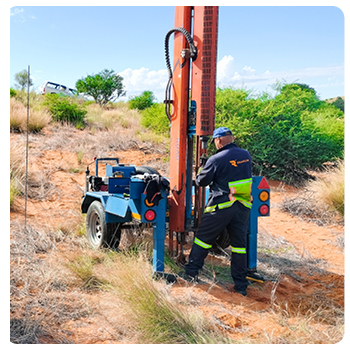

Centreline Investigations
Centreline investigations involve a series of tests and procedures to determine the characteristics and suitability of soil along a planned road alignment.
In-Situ Testing
Nuclear densities are performed to assess the compaction of the soil.
Dynamic Cone Penetrometer (DCPS) tests provide a measure of the in-situ strength of the soil layers, giving insight into its load-bearing capacity.
Hand-dug test pits allow for direct observation and analysis of soil strata and conditions.
Laboratory Testing
Soil Classifications involve a range of testing (including Atterberg Limits) that provides valuable information about the type of soil present on a site and it’s behaviour under different conditions.
MDD (Maximum Dry Density, known as a MOD) testing establishes the maximum unit weight a soil sample can achieve at its optimum moisture content.
The Road Indicator test evaluates the soil’s performance as a road material, including its susceptibility to shrinkage and swelling as well as providing a grading envelope for the material.
CBR (California Bearing Ratio) are common tests used to evaluate subgrade strength, primarily of roads, pavements and foundations.
UCS (Unconfined Compressive Strength) testing determines the maximum compressive stress that soil can bear while Indirect Tensile Strength (ITS) determines soil’s strength and adherence against fatigue, temperature cracking and rutting.


Nuclear Densities

Dynamic Cone Penetrometer (DCP)
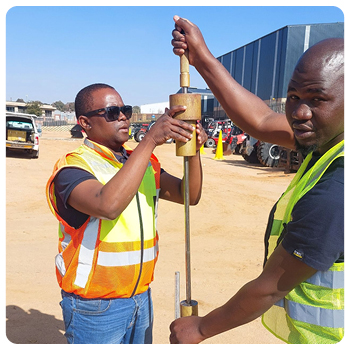
Hand-Dug Test Pits

Soil Profiling

California Bearing Ratio (CBR)

Soil Classifications

Maximum Dry Density (MDD)
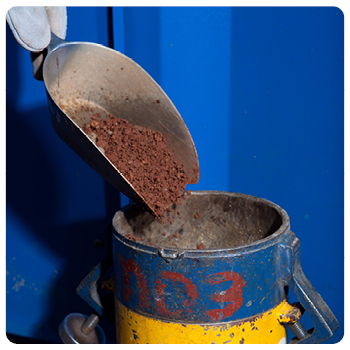
Road Indicator Test
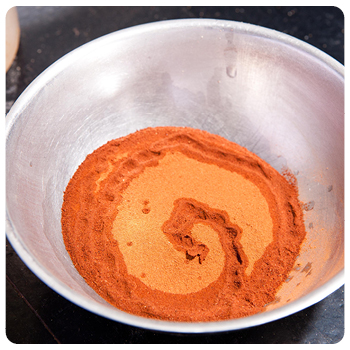
Unconfined Compressive Strength (UCS)
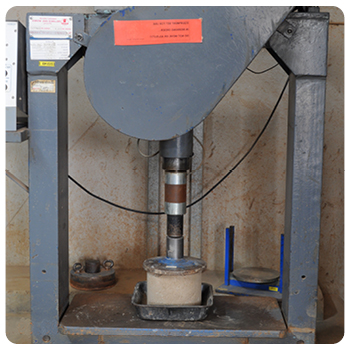
Borrowpit Investigations
Borrowpit investigations are crucial for identifying and evaluating soil resources that can be used in construction.
TLB/Excavator Test Pits are dug to expose soil layers for direct sampling and examination.
To accurately determine the suitability of borrowpit material for construction, proper representative sampling is essential. Samples are then sent to the laboratory for assessment.
MDD (Maximum Dry Density, known as a MOD) testing establishes the maximum unit weight a soil sample can achieve at its optimum moisture content.
The Road Indicator test evaluates the soil’s performance as a road material, including its susceptibility to shrinkage and swelling as well as providing a grading envelope for the material/
CBR (California Bearing Ratio) are common tests used to evaluate subgrade strength, primarily of roads, pavements and foundations.
UCS (Unconfined Compressive Strength) testing on stabilised materials determines the maximum compressive stress that soil can bear while Indirect Tensile Strength (ITS) determines soil’s strength and adherence against fatigue, temperature cracking and rutting.
A Borrowpit Utilisation Plan outlines how the resources from the borrowpit will be extracted and used efficiently while minimizing environmental impact.


TLB/Excavator Test Pits

Soil Sampling
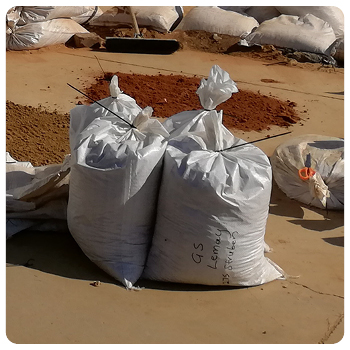
MODS (Maximum Dry Density)

Road Indicator Test

Unconfined Compressive Strength (UCS)

Indirect Tensile Strength (ITS)
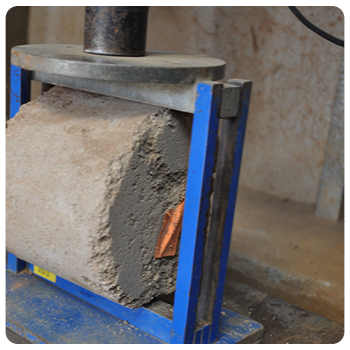
Borrowpit Utilisation Plan

In-Situ Investigations
In-situ investigations are the first step in understanding the soil and subsurface conditions of a construction site.
These investigations involve testing the ground directly at the location where construction will take place, providing real-time data on soil strength, density, moisture content and collapse potential.
The Collapse Potential Test assess the potential for soil to swell when wet or collapse when dry, influencing foundation stability.
Key tests include in-situ Dynamic Cone Penetrometer (DCP) testing and Deep Probe Super Heavy (DPSH) testing for assessing in-situ soil bearing capacity, while hand-dug test pits allow for direct observation and profiling of soil layers on site.
When more thorough investigations are required, borehole drilling is performed to assess the underlying rock strata and obtain deeper and more revealing Shelby tube samples for further analysis.
Uniaxle Compressive Strength, Point Load Testing and Core Logging are also part of our specialised in-situ tests.
These services provide the foundational data needed to assess the suitability of soil, rock and underground conditions at a site, offering critical insights to inform design and planning phases.

Nuclear Densities

Dynamic Cone Penetrometer (DCP)

Deep Probe SuperHeavy

Collapse Potential

TLB/Excavator Test Pits

Hand-Dug Test Pits

Dolomite Stability Investigations
In addition to standard onsite investigations and laboratory testing, we offer specialised geotechnical tests tailored to specific ground conditions that may present unique challenges.
These tests ensure comprehensive risk assessment and mitigation strategies for complex projects.
Dolomitic Stability Investigations, in areas with dolomitic rock formations, reduce the risk of sinkholes and subsidence which poses a serious threat to infrastructure, allowing for appropriate mitigation
measures to protect structures and prevent ground collapse.
Other testing in this field includes gravity surveys, XRDs and MASWs.

Specialised Testing
These test focus on how soils behave under sustained loading conditions.
Single and Double Oedometer testing measures the soil’s ability to compress and consolidate under applied loads, helping predict potential settlement issues.
Anisotropic Consolidation tests provide detailed data on soil behavior under varied stress directions, essential for complex load conditions.
Swell Pressure and Volume Collapse Tests determine the potential for soils, especially clay-rich ones, to expand or collapse, which is crucial for construction in variable moisture environments.
Free Swell and Collapse Potential Tests assess the potential for soil to swell when wet or collapse when dry, influencing foundation stability.
Triaxial Testing (CD, CU, and UU) evaluate soil strength, deformation, and pore pressure under simulated field conditions. Multistage triaxial testing provides a detailed understanding of soil behavior under various stress levels.
The Shearbox test measures the shear strength of soils by applying horizontal forces to a confined sample, crucial for slope stability and retaining wall design.
Drained Settlement Density Determination testing assesses how much soil will settle and its final density under drained conditions, vital for foundation and load-bearing structure design, while Wax Density Testing determines soil density by coating the sample with wax and measuring its volume and mass.
Permeability Tests (Constant Head, Falling Head, and Flexible Head Permeability) measure the ease with which water moves through the soil, crucial for drainage design and slope stability.
A Pinhole Test is used to identify and classify the erodibility of the soil based on the flow rate of discharge water, cloudiness, the size of the hole, and the applied pressure.
The Crumb Test assesses the durability of soil aggregates and their breakdown under mechanical agitation or exposure to water whereas the Lump Test evaluates the degree of saturation and void ratio of a dry sample to determine maximum saturation point.


Single, Double Oedometer Tests

Anisotropic Consolidation Tests

Swell Pressure and Volume Collapse Tests

Free Swell, Collapse Potential Tests

Triaxial Testing

Shearbox Test

Permeability Testing

Pinhole Testing


